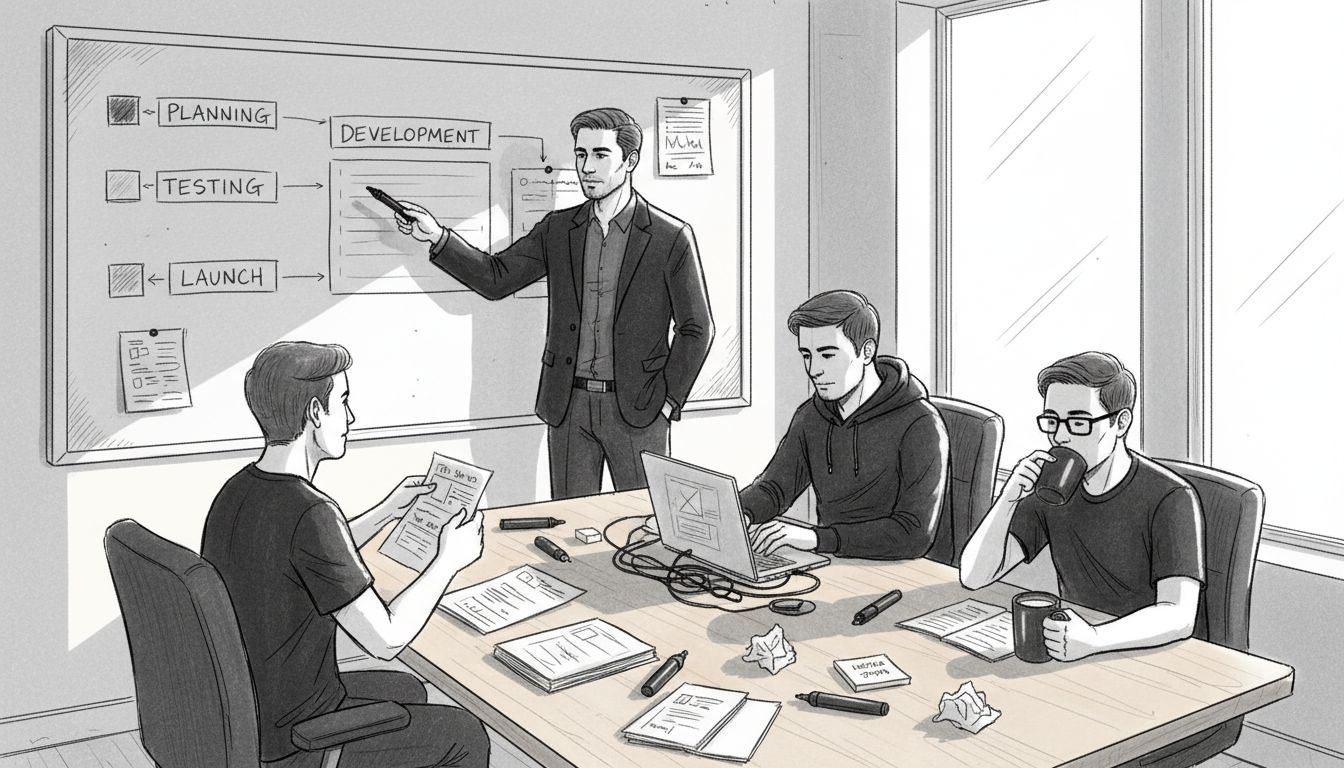AI is no longer just a buzzword in project management. Teams using AI now see up to 40 percent fewer project risks and save 35 percent of their time on paperwork. Here is where it gets wild. These huge results do not come from robots taking jobs. The real breakthrough is how AI frees managers to focus on smarter decisions and creative problem-solving instead of drowning in spreadsheets.
Table of Contents
- How Ai Transforms Project Management Processes
- Top Ai Tools For Different Project Roles
- Implementing Ai: Best Practices For Teams
- Future Trends Of Ai In Project Management
Quick Summary
| Takeaway | Explanation |
|---|---|
| AI Reduces Project Risks | AI-driven risk assessment can lower project risks by up to 40% through data analysis, allowing early identification and proactive mitigation of potential issues. |
| Time Savings Through Automation | AI can save project managers 35% of their time on administrative tasks, enabling them to focus on strategic activities like stakeholder engagement and complex problem-solving. |
| Enhanced Decision-Making with Predictive Analytics | The integration of AI has led to approximately a 20% improvement in project success rates by providing real-time performance tracking and informed decision-making capabilities. |
| Importance of Governance and Change Management | Effective AI implementation requires establishing ethical frameworks and engaging stakeholders to navigate cultural shifts, ensuring a collaborative environment for technology adoption. |
| Future of Project Management with Augmented Intelligence | Upcoming trends indicate AI will evolve into a tool that augments human decision-making, with systems providing contextual recommendations that enhance strategic planning capabilities. |

How AI Transforms Project Management Processes
AI is fundamentally reshaping project management by introducing unprecedented levels of intelligence and efficiency into traditional workflows. Project managers now have powerful tools that dramatically enhance decision-making, resource allocation, and overall project performance.
Intelligent Risk Assessment and Prediction
Traditional project management relied heavily on human intuition and manual risk analysis. AI has revolutionized this approach by providing data-driven insights that transform risk management strategies. According to research from management consulting experts, AI-driven risk management can reduce project risks by up to 40% by analyzing complex data patterns and identifying potential challenges before they escalate.
AI algorithms can now process vast amounts of historical project data, identifying subtle patterns that human analysts might overlook. These intelligent systems can predict potential bottlenecks, resource constraints, and timeline disruptions with remarkable accuracy. By flagging potential risks early, project teams can develop proactive mitigation strategies, ultimately saving time and resources.
Automation of Administrative Tasks
Project managers spend an enormous amount of time on repetitive administrative tasks that could be better utilized for strategic planning. Global research indicates that AI is projected to save project managers 35% of their time on administrative work.
This time savings translates into significant productivity gains. AI-powered tools can now automatically:
- Generate detailed project reports
- Schedule meetings and coordinate team calendars
- Track resource utilization
- Monitor project progress in real-time
- Create and update project documentation
By offloading these routine tasks to intelligent systems, project managers can focus on high-value activities like stakeholder engagement, strategic decision-making, and complex problem-solving.

Enhanced Decision-Making and Performance Tracking
AI introduces a new paradigm of data-driven project management. With advanced machine learning algorithms, project teams can now access predictive analytics that offer unprecedented insights into project trajectories. Studies show that AI integration has led to approximately a 20% improvement in project success rates across various industries.
These intelligent systems can analyze multiple variables simultaneously, providing nuanced recommendations that go beyond traditional project management approaches. Real-time performance tracking, resource optimization, and predictive modeling become seamless, enabling teams to make more informed decisions quickly and accurately.
As AI continues to evolve, project management will increasingly become a collaborative effort between human expertise and machine intelligence. The future belongs to teams that can effectively leverage these powerful technological tools to drive innovation, efficiency, and strategic success.
By embracing AI-driven project management processes, organizations can transform their approach from reactive problem-solving to proactive, intelligent project execution.
To provide a clear overview, here is a table summarizing the major AI-driven transformations in project management processes discussed above:
| Area of Transformation | Traditional Approach | AI-Driven Approach |
|---|---|---|
| Risk Management | Manual, intuition-based risk analysis | Data-driven predictions, early risk identification |
| Administrative Task Handling | High manual workload on repetitive documentation | Automated scheduling, reporting, documentation |
| Decision-Making and Performance Tracking | Limited by human analysis and slow reporting | Predictive analytics, real-time performance tracking |
| Resource Allocation | Manual task assignment based on availability | Intelligent task assignment based on skills and past data |
Top AI Tools for Different Project Roles
AI tools are rapidly transforming project management by providing specialized solutions tailored to different professional roles. Understanding how these tools can optimize specific responsibilities is crucial for modern teams seeking enhanced productivity and strategic efficiency.
AI Tools for Project Managers
Project managers require comprehensive tools that streamline complex workflows and provide strategic insights. Research from AI management experts reveals that AI-driven resource allocation algorithms can assess project requirements and team members’ skills to assign tasks effectively, preventing potential bottlenecks.
Key AI capabilities for project managers include:
- Predictive Planning: Advanced algorithms that forecast project timelines and potential risks
- Resource Optimization: Intelligent task assignment based on team skills and historical performance
- Performance Analytics: Real-time tracking and comprehensive project health monitoring
These AI tools enable project managers to transition from reactive management to proactive strategic leadership, significantly reducing administrative overhead and improving overall project outcomes.
AI Solutions for Team Collaboration
Collaboration represents a critical area where AI tools are making substantial impacts. According to collaborative technology research, AI-powered project management tools can enhance team interactions by up to 25% through intelligent features.
Innovative AI collaboration tools offer:
- Automatic document suggestion and relevance matching
- Real-time communication translation for multilingual teams
- Intelligent meeting scheduling and conflict resolution
- Context-aware task prioritization
By leveraging these advanced tools, teams can overcome traditional communication barriers and create more synchronized, efficient work environments.
AI Risk Management and Predictive Tools
Risk management represents another critical domain where AI tools are revolutionizing project processes. Specialized research demonstrates that AI algorithms can analyze historical project data to identify potential risks with unprecedented accuracy.
Advanced AI risk management tools provide:
- Comprehensive risk probability assessment
- Automated scenario simulation
- Predictive outcome modeling
- Intelligent mitigation strategy recommendations
These sophisticated tools transform risk management from a reactive process to a proactive, data-driven approach. Project teams can now anticipate challenges, simulate potential scenarios, and develop robust contingency plans before issues emerge.
As AI technology continues to evolve, the integration of intelligent tools across different project roles will become increasingly sophisticated. Organizations that embrace these technological innovations will gain significant competitive advantages, creating more agile, efficient, and responsive project ecosystems.
The future of project management lies not in replacing human expertise, but in empowering professionals with intelligent tools that augment their strategic capabilities and decision-making processes.
Here is a summary table outlining the main AI tool capabilities for different project management roles as described above:
| Project Role | Key AI Capabilities | Primary Benefits |
|---|---|---|
| Project Manager | Predictive planning, resource optimization, performance analytics | Reduced overhead, proactive leadership |
| Team Collaboration | Document suggestions, real-time translation, smart scheduling | Improved efficiency, better communication |
| Risk Management | Risk assessment, scenario simulation, predictive modeling | Early risk detection, proactive planning |
Implementing AI: Best Practices for Teams
Successful AI implementation in project management requires a strategic, thoughtful approach that goes beyond mere technological adoption. Teams must develop comprehensive strategies that address technical, organizational, and human factors to maximize the potential of AI-driven tools.
Establishing Clear Governance and Ethical Frameworks
Research from governance experts emphasizes the critical importance of establishing robust governance structures for AI integration. Transparent oversight mechanisms ensure responsible AI deployment, protecting both organizational interests and team dynamics.
Key governance considerations include:
- Developing Ethical Guidelines: Creating clear policies around AI use and decision-making
- Accountability Protocols: Establishing mechanisms for tracking AI-generated recommendations
- Compliance Frameworks: Ensuring alignment with industry regulations and data protection standards
Organizations must view AI governance as a dynamic process, continuously evolving to address emerging technological and ethical challenges. This approach transforms AI from a mere tool into a strategic organizational asset.
Change Management and Stakeholder Engagement
Experts in organizational transformation highlight that successful AI implementation is fundamentally a human-centered process. Effective change management becomes crucial in navigating the cultural and operational shifts introduced by AI technologies.
Strategic change management approaches include:
- Identifying and engaging key stakeholders early
- Developing comprehensive communication strategies
- Providing targeted training and skill development
- Creating feedback mechanisms for continuous improvement
By prioritizing human factors, teams can mitigate resistance and create a collaborative environment that embraces technological innovation.
Robust Testing and Continuous Evaluation
Government AI implementation guidelines underscore the significance of dedicated testing and evaluation processes. Systematic assessment helps manage risks, optimize system performance, and ensure responsible AI deployment.
Comprehensive testing strategies should include:
- Performance Benchmarking: Comparing AI tool outcomes against traditional methods
- Risk Assessment: Identifying potential biases or unexpected behavior
- Incremental Implementation: Phased rollout to minimize disruption
- Continuous Monitoring: Regular evaluation of AI tool effectiveness
Teams must approach AI implementation as an iterative process, maintaining flexibility and openness to refinement. The goal is not perfect implementation, but continuous learning and improvement.
Successful AI integration requires a holistic approach that balances technological capabilities with human expertise. Organizations that develop comprehensive strategies, prioritize ethical considerations, and maintain a learning-oriented mindset will be best positioned to leverage AI’s transformative potential in project management.
The future of project management lies in creating symbiotic relationships between human intelligence and artificial capabilities, where technology amplifies human potential rather than replacing it.
Future Trends of AI in Project Management
The landscape of project management is rapidly evolving, with AI poised to fundamentally reshape how organizations plan, execute, and track complex initiatives. Emerging technological trends promise to transform project management from a traditional administrative function into a strategic, intelligence-driven discipline.
Augmented Intelligence and Predictive Decision Making
Research from technology management experts reveals that AI is increasingly becoming an augmented intelligence tool, specifically designed to assist project managers in handling intricate, interconnected tasks. Unlike previous automation approaches, future AI systems will provide nuanced, contextual recommendations that complement human strategic thinking.
Key developments in augmented intelligence include:
- Advanced Scenario Modeling: AI systems that can simulate complex project scenarios with unprecedented accuracy
- Contextual Risk Assessment: Intelligent algorithms that understand project-specific variables beyond standard metrics
- Adaptive Learning Mechanisms: Systems that continuously refine their predictive capabilities based on real-world project outcomes
These advanced AI tools will transform project managers from reactive problem solvers to proactive strategic architects, enabling more sophisticated and intelligent project planning.
Technological Convergence and Integrated Systems
Emerging technology research highlights the potential of integrating AI with complementary technologies like Internet of Things (IoT) and blockchain. This convergence promises to create more transparent, secure, and dynamically responsive project management ecosystems.
Potential integration capabilities include:
- Real-time resource tracking using IoT sensors
- Immutable project documentation through blockchain
- Automated compliance monitoring
- Enhanced data integrity and traceability
By breaking down technological silos, these integrated systems will provide project managers with holistic, instantaneous insights across complex organizational landscapes.
Hyper-Personalized and Autonomous Project Management
Futurist technology forecasts predict a radical transformation in project management methodologies by 2035. Emerging AI systems will move beyond generic recommendations to deliver hyper-personalized project strategies tailored to specific organizational contexts and individual team dynamics.
Anticipated autonomous project management features include:
- Self-Adjusting Project Timelines: AI systems that automatically recalibrate project schedules based on real-time performance data
- Intelligent Resource Allocation: Dynamic team composition and skill matching
- Predictive Performance Optimization: Proactive identification and mitigation of potential project bottlenecks
These autonomous systems represent a paradigm shift from traditional project management approaches, offering unprecedented levels of adaptability and strategic precision.
As AI technologies continue to mature, the role of project managers will evolve from direct controllers to strategic orchestrators. The most successful professionals will be those who can effectively collaborate with intelligent systems, leveraging AI’s computational power while contributing uniquely human creativity and strategic insight.
The future of project management is not about replacing human expertise but creating a symbiotic relationship where artificial intelligence amplifies human potential, driving innovation and organizational excellence.
Frequently Asked Questions
What benefits does AI bring to project management?
AI enhances project management by reducing project risks by up to 40%, saving 35% of time on administrative tasks, and improving decision-making through predictive analytics, leading to greater overall success rates.
How does AI help in risk assessment for projects?
AI utilizes data-driven insights to identify potential risks early in the project lifecycle, enabling teams to develop proactive mitigation strategies and manage project challenges more effectively.
What are some top AI tools for project managers?
Key AI tools for project managers include predictive planning algorithms, resource optimization tools, and performance analytics platforms that streamline workflows and improve project outcomes.
What are the best practices for implementing AI in project management?
Best practices include establishing clear governance and ethical frameworks, engaging stakeholders, and maintaining robust testing and continuous evaluation processes to ensure effective AI integration.
Experience Less Risk and More Results With AI-Powered Project Management
Feeling swamped by endless paperwork and worried about project risks? The article covers how AI is transforming project management by helping you avoid hidden roadblocks, cut the time spent on repetitive tasks, and make clear data-driven decisions. Many teams face unpredictable bottlenecks, resource gaps, and lost hours in admin work. That is where Gammatica steps in.

If you want to reclaim up to 16 hours a week, see fewer project risks, and keep everyone aligned in real time, Gammatica has the automation and collaboration features you need. Try Kanban boards, smart scheduling, integrated online meetings, and permission controls all in one place. Let Gammatica do the heavy lifting. Start building intelligent workflows and stay ahead of every project twist. Discover how much smoother your next project can run by visiting Gammatica’s main site now. Take control of your team’s success today.



